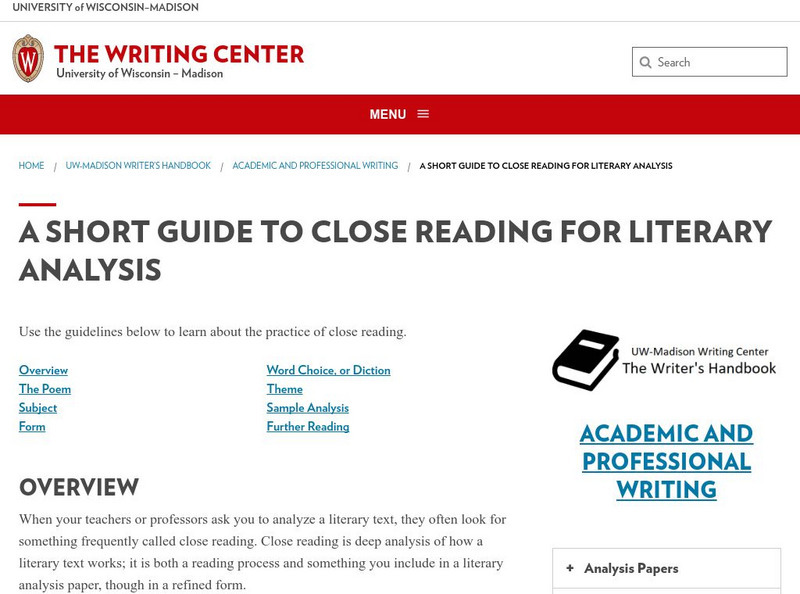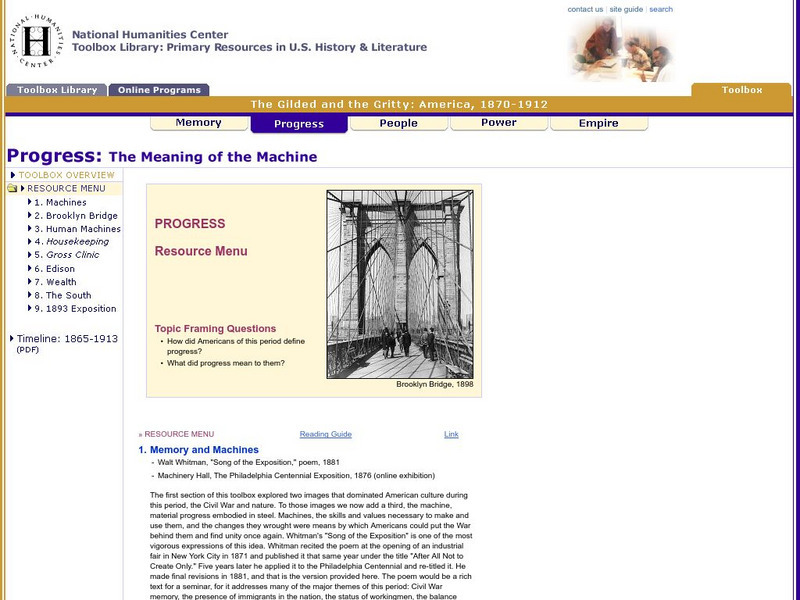Hi, what do you want to do?
Curated OER
Heritage: Legends, Fairy Tales and the Native Americans
Fourth graders compare and contrast a Native American legend with a fairy tale and share their ideas by creating a venn diagram.
Curated OER
Tough Decisions
Students examine different problem situations that could be encountered during the building of the capitol building. They are divided into small groups and given a card with a problem written on it. Then students brainstorm in order to...
Curated OER
Negotiating Treaties
Eleventh graders recognize the interaction between early settlers and indigenous people in the U.S. They recognize the impact of the Indian Removal Act on displaced Natives in the early West and the impact on Native attitudes today.
Curated OER
Causes and Effects of the Civil War
Fifth graders identify the causes and effects of the Civil War. They use Inspiration Software.
Curated OER
A Courtin' We Will Go
Pupils investigate dialect in poetry as an indication of a people's culture in literature. They write a poem about dating in this era.
Curated OER
Creating Communities
Learners design a community with minimal environmental impact. They rate each other's community's presentation using the "Planning and Zoning Commission Rating Scale".
Curated OER
IMF/World Bank - World Bank & IMF Lesson Plan
Pupils study international organizations and their purposes and functions in the world.
Curated OER
Let's Make Bread!
Students participate in making bread. They are required to follow the recipe and directions given to them by the teacher. A field trip to the grocery store can also be included.
Curated OER
Lesson 1: Design a Transportation Stamp
Young scholars, in groups, research a certain form of transportation that has affected Maine's economic and cultural development. They write a persuasive letter that uses the research to support an argument.
Curated OER
In Search of Al Qaeda
Students view a PBS Frontline video online entitled, "In Search of Al Qaeda." They complete pre-viewing activities in which they examine the use of primary sources. They look at the key groups and individuals and the history of...
Curated OER
Journalism: Potential Bias
Students investigate a current event involving the United States from different journalistic viewpoints. They compare a Western newspaper with one from the Middle East and submit written evaluations noting agreements and disagreements in...
Curated OER
A History of Changing Foods
Students conduct Internet research to determine how food preparation and recipes have changed over time. They trace a favorite food through time, complete a worksheet and compare diets from different eras.
Curated OER
Making More Places at the Table
Fifth graders explore the use of primary and secondary source documents. They identify primary and secondary sources. Students investigate individuals that made a difference during the American Civil Rights Movement through the use of...
Curated OER
The World Does Business With Nebraska
Students investigate the concept of exporting goods from the state of Nebraska. They develop skills of analysis while looking at the goods and services of the state to the international market. They conduct research and create a report...
Curated OER
DNA Recombination II
Young scholars model recombination in DNA. They color the DNA sample and cut it out. Students use their "restriction enzymes" to cut the DNA into specific fragments. They separate the fragments using the "gel electrotrophoresis." ...
Polk Brothers Foundation Center for Urban Education at DePaul University
De Paul University: Center for Urban Education: Guided Reading/listening Ques: Nonfiction[pdf]
This graphic organizer will assist students with taking notes connected nonfiction content. After taking notes with the graphic organizer, students will ask guiding questions listed on the sheet.
Polk Brothers Foundation Center for Urban Education at DePaul University
Depaul University: Center for Urban Education: Guide/assess Nonfiction Reading
This site contains 47 one-page guided writing and reading guides and assessments.The reproducibles are copyrighted materials but may be copied and used for educational purposes.
University of Wisconsin
Univ. Of Wisconsin: Writing Center: Guide to Close Reading for Literary Analysis
This guide discusses how to approach analysis of a literary text, with the main focus being on the poem "Design" by Robert Frost. It explains how to examine the subject, the form, word choice or diction, and the theme. In each section,...
Polk Brothers Foundation Center for Urban Education at DePaul University
Depaul University: Center for Urban Education: Guide Nonfiction Reading
This site contains 17 nonfiction articles that are appropriate for students with a 6th grade reading level, as measured by the Fry Formula. Questions for each passage are provided. These graphic organizers are copyrighted and may be used...
American Institutes for Research
Center on Response to Intervention:multi Tier Reading Intervention:primary Grade
This Practice Guide, by the Institute of Education Sciences (IES) in February 2009, aims to help educators develop and implement RTI to assist students struggling with reading. The focus is building an instructional program in order to...
PBS
Pbs: American Experience: The Center of the World: Teacher's Guide
Students will have an opportunity to create memorials at the World Trade Center site to commemorate the September 11th attacks. Come and check it out.
Colorado State University
Colorado State Writing Center: Critical Reading
In-depth instructions on critical reading with lots of links to more reading guides and activities. A good site to help improve reading skills to become a better writer.
National Humanities Center
National Humanities Center: Toolbox Library: The Gilded and the Gritty: 1870 1912: Progress: The Meaning of the Machine
Nine primary source resources describing the way people thought about progress during the Gilded Age, 1870-1912. Includes guided reading, links to supplemental material, and timeline.
National Humanities Center
National Humanities Center: Toolbox Library: Gilded and Gritty: America, 1870 1912: Power: Taming the Octopus
A series of primary resources for students and teachers explores public response to the economic and political shifts during the Gilded Age. Includes questions for guided reading and links to supplemental material.




















![De Paul University: Center for Urban Education: Guided Reading/listening Ques: Nonfiction[pdf] Graphic De Paul University: Center for Urban Education: Guided Reading/listening Ques: Nonfiction[pdf] Graphic](https://static.lp.lexp.cloud/images/attachment_defaults/resource/large/FPO-knovation.png)







